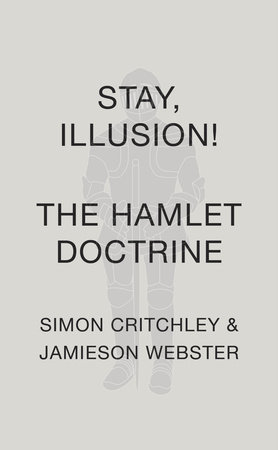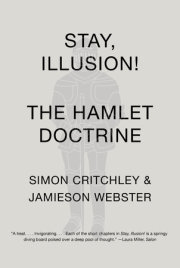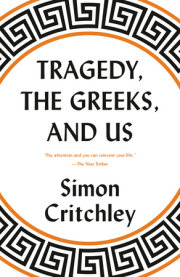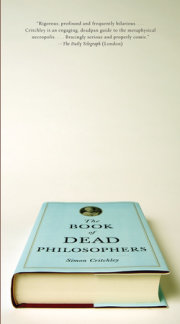Praised Be Rashness
This little book is the late-flowering fruit of a shared obsession. Although Hamlet makes himself crystal clear during his lambasting of Ophelia, “I say, we will have no mo marriage,” we are married, and Shakespeare’s play, its interpretation, and philosophical interpreters have been a goodly share of our connubial back and forth over the last couple of years. We are outsiders to the world of Shakespeare criticism and have chosen as a way into the play a series of outsider interpretations of Hamlet, notably those of Carl Schmitt, Walter Benjamin, Hegel, Freud, Lacan, and Nietzsche. What each of these interpretations enables is a bold but -sometimes distant and rash take on Hamlet. We will try to use these interpretations as a set of levers with which to twist open a closer and, we hope, compelling textual engagement with the play itself. Not that we are above rashness ourselves, and if an approach shapes our interpretation, that we might dupe the reader by calling a methodology, then it takes its cue from Virginia Woolf. In her wonderful essay “On Being Ill,” she writes:
Rashness is one of the properties of illness—outlaws that we are—and it is rashness that we need in reading Shakespeare. It is not that we should doze in reading him, but that, fully conscious and aware, his fame intimidates and bores, and all the views of all the critics dull in us that thunder clap of conviction which, if an illusion, is still so helpful an illusion, so prodigious a pleasure, so keen a stimulus in reading the great. Shakespeare is getting flyblown; a paternal government might well forbid writing about him, as they put his monument at Stratford beyond the reach of scribbling fingers. With all this buzz of criticism about, one may hazard one’s conjectures privately, making one’s notes in the margin; but, knowing that someone has said it before, or said it better, the zest is gone. Illness, in its kingly sublimity, sweeps all that aside and leaves nothing but Shakespeare and oneself. What with his overweening power and our overweening arrogance, the barriers go down, the knots run smooth, the brain rings and resounds with Lear or Macbeth, and even Coleridge himself squeaks like a distant mouse.
In the name of zest, and in order to make brains ring and Shakespeare resound, we will proceed, as Hamlet says to Horatio, “Rashly—And praised be rashness for it.”
###
The Gap Between Thought and Action
For some, and it is a popular view that goes back at least to Goethe, Hamlet is a man who simply cannot make up his mind: he waits, hesitates, and is divided from himself in his “madness,” all the while dreaming of a redeeming, cataclysmic violence. In this view, Hamlet is a creature of endless vacillation, a cipher for the alienated inward modern self in a world that is insubstantial and rotten: “Denmark’s a prison,” Hamlet sighs. For others, Hamlet is the great melancholic who is jealous of Claudius because he has realized his secret desire, namely, to usurp the place of his rival in the affection of his mother.
For still others, Hamlet is not so much a bather in the black sun of depression as too much in the sun of knowledge. Through the medium of the ghost, he has grasped the nature of that which is; that is, himself, his family, and the corrupt political order that surrounds him. Unlike some of the heroes in Attic tragedy, like Oedipus, who act first and then find out the truth later, Hamlet knows the truth from the ghost’s mouth in act 1. This truth does not lead to action but instead to a disgust with or nausea from existence. In this view, Hamlet is a kind of anti-Oedipus: whereas the latter moves ragefully from ignorance to knowledge, and his insight requires the loss of his sight in a violent act of self-blinding, the great Dane knows the score from the get-go, but such knowledge does not seem to lead to action. Maybe action requires veils of illusion, and once those veils are lifted, we feel a sense of resignation.
Whatever the truth of the various interpretations, there seems to be a significant disconnection between thought and action in the person of Hamlet. Consider the famous “To be, or not to be” soliloquy. After contemplating suicide as an attempted “quietus” from a “weary life,” Hamlet ponders the dread of life after death, “the undiscovered country from whose bourn no traveler returns” (apart from the ghost, of course, who seems to have a return ticket). The possibility of life after death “puzzles the will” and makes us endure the sufferings that we have rather than risk ones we know nothing of but that could be much worse. He continues:
Thus conscience does make cowards of us all,
And thus the native hue of resolution
Is sicklied over with the pale cast of thought,
And enterprises of great pitch and moment,
With this regard their currents turn awry
And lose the name of action.
Thought and action seem to pull against each other, the former annulling the possibility of the latter. If, as Hamlet says elsewhere, “there is nothing either good or bad but thinking makes it so,” then thinking makes things rather bad, and any resolution dissolves into thin air. Speaking of thin air, we might notice that when the ghost makes his final appearance in the play, in a scene of almost-unbearable verbal and near-physical violence, with Hamlet raging at his mother for her inconstancy, the ghost says that “This visitation / is but to whet thy almost blunted purpose.” Hamlet confesses to being a “tardy son” who has not committed “Th’ important acting” of the ghost’s command.
The ghost asks Hamlet to step between his mother and her fighting soul and speak the truth. For a moment it seems as if he might—“dear mother, you are sleeping with your husband’s murderer.” But as she mumbles the word “ecstasy,” Hamlet careens into the most pathetic of adjurations, begging Gertrude not to sleep again with Claudius, laying down arms before the truth, once again. “Conceit in weakest bodies strongest works,” the ghost says.
###
The Mouse-trap
The only way in which it appears that Hamlet can attempt to close the gap between thought and action is through the ultimate conceit, that is, through theater, through play. The purpose of the play within the play in act 3, The Mouse-trap, is to produce a thing that will catch the conscience of the king. But as Hamlet is acutely aware—and, one naïvely presumes, that enigma that we name “Shakespeare” who lurks ghostly in the wings (and there is an ancient, if unverifiable, tradition that Shakespeare played the role of the ghost in the original performance, opposite Richard Burbage’s Hamlet)—a play is nothing, namely, nothing real. It is, rather, “a fiction . . . a dream of passion” and this realization is somehow “monstrous.” Theater is “all for nothing.” What are the sufferings of Hecuba or indeed Hamlet to us? Yet, Hamlet would seem to be suggesting that the manifest fiction of theater is the only vehicle in which the truth might be presented.
The trap works, and the mouse-king’s conscience is caught. The dumb show reenactment of Hamlet Senior’s murder pricks the king’s conscience, and he flees the theater calling for “light.” We then find Claudius alone confessing his fratricidal crime, “O, my offense is rank.” On the way to his mother’s bedroom, to which he’s been summoned, Hamlet passes Claudius kneeling in futile prayer. With Claudius genuflecting, head bowed, it is clear that now Hamlet could do it. With one swoop of his sword, thought and action would be reconciled and Hamlet’s father revenged. But at that precise moment, Hamlet begins to think and decides that this is the wrong moment to kill Claudius because he is at prayer and trying to make his amends with heaven. It is “hire and salary,” he says, “not revenge.” Hamlet then fantasizes about killing Claudius at the right moment, “When he is drunk asleep, or in his rage, or in th’ incestuous pleasure of his bed.” He sheathes his sword and moves quickly to meet Gertrude, repeatedly and manically calling her: “Mother, mother, mother!” Following the express instructions of the ghost, Hamlet has resolved to use no more in his encounter with his mother than words, words, words: “I will speak daggers to her, but use none.”
It is not that Hamlet cannot act. He kills Polonius, sends Rosencrantz and Guildenstern to their doom in -En-gland, is quasi-responsible for the death of Ophelia, and eventually dispatches Claudius. But the death of Polonius is inadvertent; he hears a noise from behind the arras and suddenly strikes and then insouciantly asks, “Is it the king?” having just left Claudius alive seconds earlier. Rosencrantz and Guildenstern die in his stead offstage—a complex letter-exchanging act of self-preservation involving piracy and ship switching that even impressed Freud, given Hamlet’s otherwise morbid inhibition. Poor Ophelia’s suicide is something like a tragic casualty of Hamlet’s unrelenting cruelty toward her. Killing Polonius is the coup de grâce in Ophelia’s unfolding psychosis. And the intended victim, Claudius, is only murdered when Hamlet has been hit with the poisoned rapier and knows that he is going to die: “I am dead, Horatio,” Hamlet repeats in three variations in a little more than twenty lines. The dying Laertes spills the beans about the plot with the poisoned rapiers and wine, “the king’s to blame,” and Hamlet stabs Claudius to death after just one line’s reflection: “The point envenomed too? / Then venom do thy work!”
Copyright © 2013 by Simon Critchley and Jamieson Webster. All rights reserved. No part of this excerpt may be reproduced or reprinted without permission in writing from the publisher.










